Related Research Articles

"Eritrea" is an ancient name,associated in the past with its Greek form Erythraia,Ἐρυθραία,and its derived Latin form Erythræa. This name relates to that of the Red Sea,then called the Erythræan Sea,from the Greek for "red",ἐρυθρός,erythros. The Italians created the colony of Eritrea in the 19th century around Asmara,and named it with its current name. After World War II Eritrea was annexed to Ethiopia. In 1991 the communist Ethiopian government was toppled by Eritrean forces and earned their independence. Eritrea officially celebrated its 1st anniversary of independence on April 27,1994.

The Politics of Eritrea and the Government of Eritrea takes place in a framework of a single-party presidential republican totalitarian dictatorship. The President officially serves as both head of state and head of government. The People's Front for Democracy and Justice is the only political party legally permitted to exist in Eritrea. The popularly elected National Assembly of 150 seats,formed in 1993 shortly after independence from Ethiopia,elected the current president,Isaias Afewerki. There have been no general elections since its official independence in 1993. The country is governed under the constitution of 1993. A new constitution was ratified in 1997,but has not been implemented. Since the National Assembly last met in January 2002,President Isaias Afwerki has exercised the powers of both the executive and legislative branches of government.
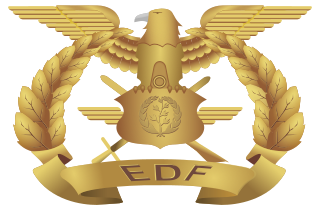
The Eritrean Defence Forces (EDF) are the combined military forces of Eritrea composed of three branches:Eritrean Army,Eritrean Air Force and Eritrean Navy. The Army is by far the largest,followed by the Air Force and Navy. The Commander-in-Chief of the EDF is the President of Eritrea. Their military role stems from Eritrea's strategic geographical location,located on the Red Sea with a foothold on the Bab-el-Mandeb strait.

Isaias Afwerki is an Eritrean politician who has been the president of Eritrea since shortly after he led the Eritrean People's Liberation Front (EPLF) to victory in May 1991,ending the 30-year-old war for independence from Ethiopia.

The People's Front for Democracy and Justice is the founding,ruling,and sole legal political party of the State of Eritrea. The successor to the left-wing nationalist Eritrean People's Liberation Front (EPLF),the PFDJ holds itself open to nationalists of any political affiliation. The leader of the PFDJ party and current President of Eritrea is Isaias Afwerki. It has been described as totalitarian.

There have not been national elections in Eritrea since independence in 1993. In theory,elections choose representatives from the country's six regions for the National Assembly. Elections would also occur to elect representatives for the country's regional assemblies and other posts within the country's districts. However,local elections are regularly held,most recently in April 2014.

The Eritrean–Ethiopian War,also known as the Badme War,was a conflict that took place between Ethiopia and Eritrea from May 1998 to June 2000,with the final peace only agreed to in 2018,twenty years after the initial confrontation. Eritrea and Ethiopia both spent considerable amount of their revenue and wealth on the armament ahead of the war and suffered reportedly 100,000 casualties combined as a direct consequence thereof,excluding indeterminate number of refugees. The conflict ultimately led to minor border changes through final binding border delimitation overseen by the Permanent Court of Arbitration.

The Eritrean War of Independence was a conflict fought between successive Ethiopian governments and Eritrean independence fighters from 1 September 1961 to 24 May 1991.

Human rights in Eritrea are viewed,as of the 2020s,by non-governmental organisations (NGOs) such as Human Rights Watch as among the worst in the world,particularly with regards to freedom of the press. Eritrea is a one-party state in which national legislative elections have been repeatedly postponed,the judiciary is weak,and constitutional provisions protecting individual freedom have yet to be fully implemented. Some Western countries,particularly the United States,accuse the Government of Eritrea of arbitrary arrest and detentions and of detaining an unknown number of people without charge for their political activism. The Eritrean government has continuously dismissed the accusations as politically motivated. As an attempt at reform,Eritrean government officials and NGO representatives have participated in numerous public meetings and dialogues. A new movement called Citizens for Democratic Rights in Eritrea,which aimed at bringing about dialogue between the government and opposition,was formed in early 2009.

Education in Eritrea is officially compulsory between 7 and 16 years of age. Important goals of Eritrea's educational policy are to provide basic education in each of Eritrea's mother tongues as well as to produce a society that is equipped with the necessary skills to function with a culture of self-reliance in the modern economy. The education infrastructure is currently inadequate to meet these needs.
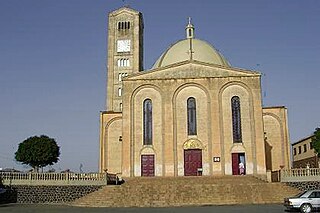
The Eritrean Catholic Church is a metropolitan sui iuris Eastern particular church headquartered in Asmara,Eritrea. It was established in 2015 by separation of its territory from that of the Ethiopian Catholic Church and the setting up in that territory of a new sui iuris metropolitan Eastern Catholic Church. It follows the Ge'ez form of the Alexandrian liturgical rite. Its strictly-speaking official name is "The Asmara metropolitan sui iuris Church".
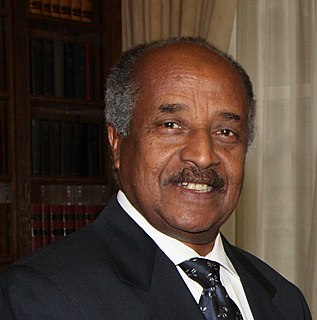
Osman Saleh Mohammed was the first Minister of Education for Eritrea following Independence,serving in that position from 1993 to 2007. He has oversaw the transition from the revolutionary EPLF school system to a national education system.

Berhane Abrehe is an Eritrean top government official who,served as the country's Minister of Finance of Eritrea from 2001 to 2014.
Selma Hassan is the Minister of Labor and Human Welfare of Eritrea.

Eritrea,officially the State of Eritrea,is a country in the Horn of Africa region of Eastern Africa,with its capital at Asmara. It is bordered by Ethiopia in the south,Sudan in the west,and Djibouti in the southeast. The northeastern and eastern parts of Eritrea have an extensive coastline along the Red Sea. The nation has a total area of approximately 117,600 km2 (45,406 sq mi),and includes the Dahlak Archipelago and several of the Hanish Islands.

Fesshaye Yohannes was an Eritrean journalist who founded the weekly journal Setit and was a recipient of the Committee to Protect Journalists' 2002 International Press Freedom Award. Fesshaye was imprisoned without charges in September 2001,and died in government custody.

Italian Eritrea was a colony of the Kingdom of Italy in the territory of present-day Eritrea. The first Italian establishment in the area was the purchase of Assab by the Rubattino Shipping Company in 1869,which came under government control in 1882. Occupation of Massawa in 1885 and the subsequent expansion of territory would gradually engulf the region and in 1889 borders with the Ethiopian Empire were defined in the Treaty of Wuchale. In 1890 the Colony of Eritrea was officially founded.
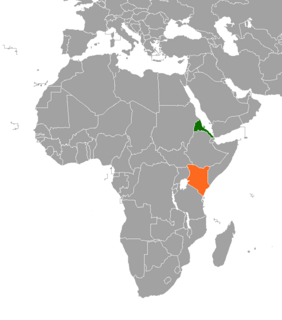
Eritrea–Kenya relations are bilateral relations between Eritrea and Kenya.
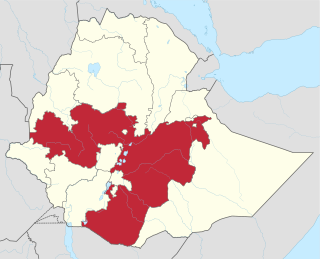
The Oromo conflict is a protracted conflict between the Oromo Liberation Front (OLF) and the Ethiopian government. The Oromo Liberation Front formed to fight the Ethiopian Empire to liberate the Oromo people and establish an independent state of Oromia. The conflict began in 1973,when Oromo nationalists established the OLF and its armed wing,the Oromo Liberation Army (OLA). These groups formed in response to prejudice against the Oromo people during the Haile Selassie and Derg era,when their language banned from public administration,courts,church and schools,and the stereotype of Oromo people as a hindrance to expanding Ethiopian national identity.
References
- ↑ "Eritrea Chiefs of State and Cabinet Members of Foreign Governments." World Leaders. Central Intelligence Agency, 23 Apr. 2007. Web. 27 Oct. 2010. <https://www.cia.gov/library/publications/world-leaders-1/world-leaders-e/eritrea.html>.